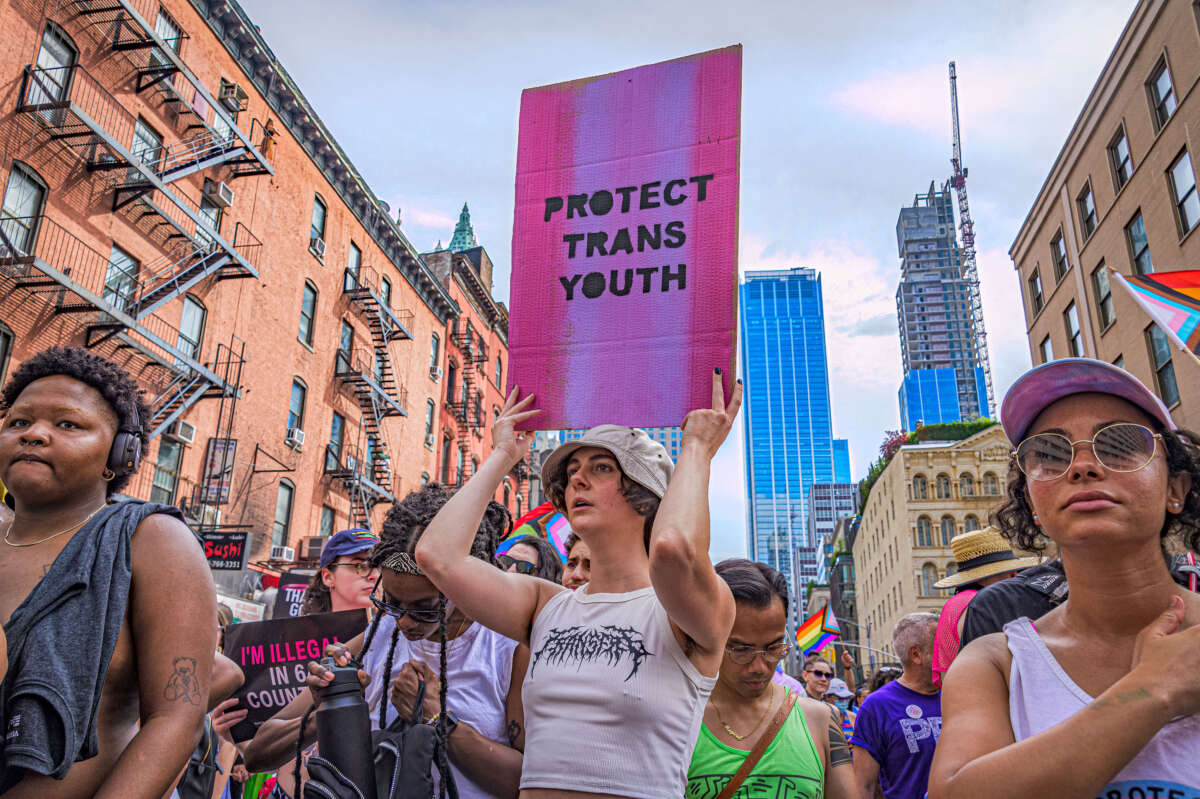Honest, paywall-free news is rare. Please support our boldly independent journalism with a donation of any size.
On Monday, the U.S. Fourth Circuit Court of Appeals ruled that state-based health care systems in North Carolina and West Virginia that prevent transgender and nonbinary people from attaining gender-affirming care were unconstitutional barriers to their needs.
The en banc ruling, in which the entire circuit court takes part, stops a discriminatory Medicaid regulation in West Virginia from being implemented. In North Carolina, a regulation blocking transgender state employees from receiving such care is also blocked due to the ruling.
The states had tried to argue that the regulations were needed for financial reasons, claiming that the costs of providing health care for transgender people would be overly burdensome. However, a number of studies and examinations of such costs demonstrate that there is no factual basis to this line of reasoning, and that providing gender-affirming care to transgender people who desire it is actually cost-effective.
Judge Roger Gregory, who authored the opinion of the court, rejected the states’ argument, writing that the “coverage exclusions facially discriminate on the basis of sex and gender identity, and are not substantially related to an important government interest.”
Gregory added that the “costs” argument from the states appeared to be a red herring. “Especially where government budgets are involved, there will frequently be a ‘rational’ basis for discrimination,” he noted.
The ruling was decided by an 8-6 majority in favor of disallowing West Virginia and North Carolina to continue discriminating against transgender residents. Although the Fourth District Court of Appeals has ruled conservatively in the past, in more recent years it has issued liberal opinions, particularly when it comes to protecting trans rights — including ruling in favor of transgender student-athletes, ruling against bathroom bans, and being the first circuit court in the country to recognize gender dysphoria as a protected disability.
West Virginia Attorney General Patrick Morrisey (R) lambasted the ruling.
“Just one single sex-transition surgery can cost tens of thousands of dollars — taxpayers should not be required to pay for these surgeries under Medicaid. Our state should have the ability to determine how to spend our resources to care for the vital medical needs of our citizens,” Morrisey complained.
Notably, not every transgender person will seek out surgery as part of their gender-affirming treatment, and not every trans person in West Virginia — representing just 0.4 percent of the state’s population — utilizes the Medicaid program. Indeed, according to a UCLA study, only about 5,700 transgender West Virginians are part of the program.
Even if one were to believe the errant presumption that every single transgender Medicaid recipient in the state would seek out gender-reassignment surgery, the cost would be a fraction of total yearly Medicaid spending, amounting to a one-time expenditure of around 3 to 9 percent of the state’s annual expenditures, based on the average costs for such surgeries.
Focusing on the cost of gender-affirming care (which doesn’t always involve surgery) also diminishes the impact of such care. For years, studies have demonstrated that gender-affirming treatment is often lifesaving for those who receive it. A 2022 study observing the effects of gender-affirming care for transgender and nonbinary youth found that such interventions were “associated with lower odds of depression and suicidality” in the 12 months after they began. And a 2021 Harvard T.H. Chan School of Public Health study found that gender-affirming surgeries led to significantly “lower rates of psychological distress and suicidal ideation.”
In saying that he would appeal the decision to the U.S. Supreme Court, Morrisey made another errant statement — that the Fourth Circuit’s ruling was based on politics from “a court dominated by Obama- and Biden-appointees.” Indeed, the judge who authored the ruling was appointed to his current post by former President George W. Bush, indicating that the decision crossed ideological lines.
Shauntae Anderson, a Black transgender woman and a West Virginia Medicaid participant who was part of the lawsuit that led to the ruling, praised the outcome.
“I am so relieved that this court ruling puts us one step closer to the day when Medicaid can no longer deny transgender West Virginians access to the essential healthcare that our doctors say is necessary for us,” Anderson said.
Tara Borelli, a senior counsel from Lambda Legal who was involved in the case, similarly celebrated the ruling.
“We are pleased with the Court’s decision, which will save lives,” Borelli said in a statement posted to the organization’s Facebook page. “It confirms that discriminating against transgender people by denying critical medical care is not only wrong but unconstitutional.”
Omar Gonzalez-Pagan, a legal counsel and health care strategist for Lambda Legal, also heralded the decision, stating that “overwhelming research has found that gender-affirming care significantly improves the overall health and wellbeing of transgender people, both youth and adults.”
“We hope this decision makes it clear to policy makers across the country that health care decisions belong to patients, their families, and their doctors, not to politicians,” Gonzalez-Pagan added.
Press freedom is under attack
As Trump cracks down on political speech, independent media is increasingly necessary.
Truthout produces reporting you won’t see in the mainstream: journalism from the frontlines of global conflict, interviews with grassroots movement leaders, high-quality legal analysis and more.
Our work is possible thanks to reader support. Help Truthout catalyze change and social justice — make a tax-deductible monthly or one-time donation today.
